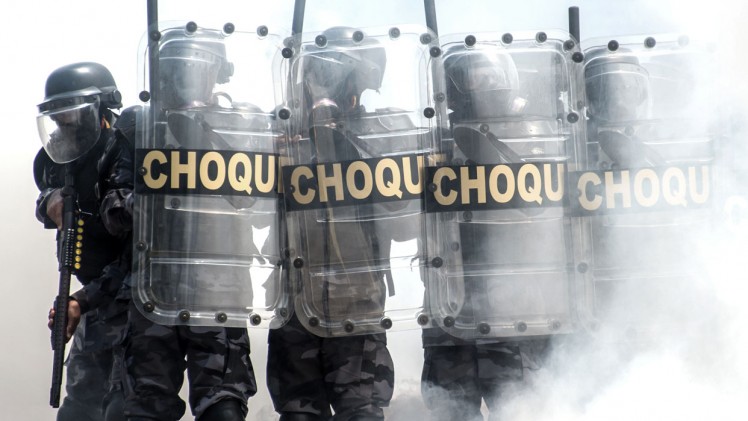Rio Olympics police warn: 'We won't be able to protect you'
Safety fears grow one month before the opening ceremony of the 2016 Olympics

A free daily email with the biggest news stories of the day – and the best features from TheWeek.com
You are now subscribed
Your newsletter sign-up was successful
Concerns are growing over security at the Olympic Games in Rio de Janeiro, which begins in one month, with Brazilian police officers themselves warning of the scale of the problem.
Street violence is increasing and police and the government "are at loggerheads" over pay and working conditions, CNN reports. "The message from police to tourists is clear: we won't be able to protect you," it adds.
Brazil has one of the highest homicide levels in the world, according to Amnesty International. "Those living in the most marginalised areas of the city are disproportionately affected by this crisis," the charity says.
The Week
Escape your echo chamber. Get the facts behind the news, plus analysis from multiple perspectives.

Sign up for The Week's Free Newsletters
From our morning news briefing to a weekly Good News Newsletter, get the best of The Week delivered directly to your inbox.
From our morning news briefing to a weekly Good News Newsletter, get the best of The Week delivered directly to your inbox.
Police budgets have been cut and salaries delayed, leading to widespread anger and protests.
"Security forces are so pressed for funds that some have to beg for donations of pens, cleaning supplies and even toilet paper," reports AP.
The situation has now deteriorated to the point where police helicopters and patrol cars have been grounded.
Officers greeted arrivals at Rio airport last week with signs reading: "Welcome to hell", and: "Police and firefighters don't get paid, whoever comes to Rio de Janeiro will not be safe."
A free daily email with the biggest news stories of the day – and the best features from TheWeek.com
Brazilian officials have dismissed the criticism, saying the Games "could start today" and that tens of thousands of security personnel will be stationed at key venues and travel hubs in the city.
"The country has put together a solid security program of 85,000 federal, state and municipal government personnel to ensure that sporting events take place in an atmosphere of absolute peace and tranquillity," said interim president Michel Temer.
But the country's problems go far beyond security concerns: a corruption scandal has led to widespread protests and the suspension of President Dilma Rousseff; Brazil has plunged into recession, and the Zika virus has led to several high-profile athletes, including golfer Rory McIlroy, pulling out of the Games.
-
 Political cartoons for February 22
Political cartoons for February 22Cartoons Sunday’s political cartoons include Black history month, bloodsuckers, and more
-
 The mystery of flight MH370
The mystery of flight MH370The Explainer In 2014, the passenger plane vanished without trace. Twelve years on, a new operation is under way to find the wreckage of the doomed airliner
-
 5 royally funny cartoons about the former prince Andrew’s arrest
5 royally funny cartoons about the former prince Andrew’s arrestCartoons Artists take on falling from grace, kingly manners, and more
-
 Epstein files topple law CEO, roil UK government
Epstein files topple law CEO, roil UK governmentSpeed Read Peter Mandelson, Britain’s former ambassador to the US, is caught up in the scandal
-
 Iran and US prepare to meet after skirmishes
Iran and US prepare to meet after skirmishesSpeed Read The incident comes amid heightened tensions in the Middle East
-
 Israel retrieves final hostage’s body from Gaza
Israel retrieves final hostage’s body from GazaSpeed Read The 24-year-old police officer was killed during the initial Hamas attack
-
 China’s Xi targets top general in growing purge
China’s Xi targets top general in growing purgeSpeed Read Zhang Youxia is being investigated over ‘grave violations’ of the law
-
 Panama and Canada are negotiating over a crucial copper mine
Panama and Canada are negotiating over a crucial copper mineIn the Spotlight Panama is set to make a final decision on the mine this summer
-
 Why Greenland’s natural resources are nearly impossible to mine
Why Greenland’s natural resources are nearly impossible to mineThe Explainer The country’s natural landscape makes the task extremely difficult
-
 Iran cuts internet as protests escalate
Iran cuts internet as protests escalateSpeed Reada Government buildings across the country have been set on fire
-
 US nabs ‘shadow’ tanker claimed by Russia
US nabs ‘shadow’ tanker claimed by RussiaSpeed Read The ship was one of two vessels seized by the US military